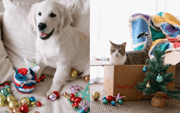Why does my cat pee on the rug? Are they trying to tell me something?
- Replies 11
As cat researchers, one of the most common complaints we hear is:
Unfortunately, a rhetoric has developed that cats are manipulative, vengeful, uncaring or even psychotic. This rhetoric means when cats do something we don’t like, it’s easy to reach for the idea they did it deliberately to hurt or annoy us.
But cats don’t behave the way humans do and their motives are not the same. They aren’t trying to irritate or punish us. So let’s forget the human rhetoric and delve into five reasons your cat might be peeing on your rug, bed or clothes.

Many illnesses or injuries – including urinary tract infections, cystitis, diabetes and chronic pain – can cause a cat to have unusual urination behaviour.
Feline idiopathic cystitis occurs in approximately 2-4% of cats worldwide. The exact causes are not known, although having an anxious or stressed cat increases the risk.
It’s often difficult to tell when a cat is sick. They are incredibly adept at hiding pain.
One clue is cats experiencing discomfort will want to pee somewhere they feel comfortable, often a place they associate with safety – such as your bed, your clothes or the rug.
One reason they may feel comfortable there is because it smells like you, someone they associate with positive feelings.
So if your cat pees somewhere odd, your first instinct should be to wonder if it’s time to contact your vet.

Situations like these could lead to your cat feeling stressed and peeing in an unexpected place.
Log the days your cat pees somewhere unusual and see if a pattern emerges.
If it correlates with something in particular – such as a friend visiting with their dog – try to adapt the house set-up to make your cat more comfortable.
For instance, keep the dog outside or put your cat in your room with their food, water and a litter tray.
Think about how to make your cat more comfortable (or remove the stressor itself).
This could be an ongoing stress from living in a multi-cat household or with a dog, or it could from a condition such as anxiety.
While chronic stress can be trickier to handle, it’s important to identify it and seek help.
Ongoing stress can lead to serious health issues such as cystitis, which can cause a urinary blockage and be life threatening. If your cat visits the litter tray and is straining without any result, this is an emergency. They need to see a vet as soon as possible.
Keep a short daily log and try to identify areas that may be causing ongoing stress for your cat.
Adjust the environment to limit these stressors and if needed, seek a veterinary behaviourist’s advice about treating potential anxiety in your cat.
And if you are very stressed, this might make your cat feel stressed. Sometimes you both need to take a deep breath!

Cats want to feel comfortable and safe when they toilet. So they may not want to use it if:
This article was first published on The Conversation, and was written by Susan Hazel, Associate Professor, School of Animal and Veterinary Science, University of Adelaide, Julia Henning, PhD Candidate, University of Adelaide
Often this complaint is based on an assumption the cat is seeking revenge or trying to send a message, The Godfather-style.My cat is a jerk! Whenever I do something he doesn’t like, he pees on my bed or the rug.
Unfortunately, a rhetoric has developed that cats are manipulative, vengeful, uncaring or even psychotic. This rhetoric means when cats do something we don’t like, it’s easy to reach for the idea they did it deliberately to hurt or annoy us.
But cats don’t behave the way humans do and their motives are not the same. They aren’t trying to irritate or punish us. So let’s forget the human rhetoric and delve into five reasons your cat might be peeing on your rug, bed or clothes.

Cats don’t behave the way humans do. Pexels/Anya Juárez Tenorio, CC BY
1. It could be a medical issue
First, ask yourself: are they sick?Many illnesses or injuries – including urinary tract infections, cystitis, diabetes and chronic pain – can cause a cat to have unusual urination behaviour.
Feline idiopathic cystitis occurs in approximately 2-4% of cats worldwide. The exact causes are not known, although having an anxious or stressed cat increases the risk.
It’s often difficult to tell when a cat is sick. They are incredibly adept at hiding pain.
One clue is cats experiencing discomfort will want to pee somewhere they feel comfortable, often a place they associate with safety – such as your bed, your clothes or the rug.
One reason they may feel comfortable there is because it smells like you, someone they associate with positive feelings.
So if your cat pees somewhere odd, your first instinct should be to wonder if it’s time to contact your vet.

Cats hide pain well. Pexels/Vikki, CC BY
2. It could be short-term stress
Has something changed in your household lately? Are you renovating? Are there loud noises? Did a new cat move in next door? Did your friend bring their dog to visit?Situations like these could lead to your cat feeling stressed and peeing in an unexpected place.
Log the days your cat pees somewhere unusual and see if a pattern emerges.
If it correlates with something in particular – such as a friend visiting with their dog – try to adapt the house set-up to make your cat more comfortable.
For instance, keep the dog outside or put your cat in your room with their food, water and a litter tray.
Think about how to make your cat more comfortable (or remove the stressor itself).
3. It could be chronic stress
Unlike a short-term stressor, chronic stress is an ongoing issue that can’t simply be stopped or removed.This could be an ongoing stress from living in a multi-cat household or with a dog, or it could from a condition such as anxiety.
While chronic stress can be trickier to handle, it’s important to identify it and seek help.
Ongoing stress can lead to serious health issues such as cystitis, which can cause a urinary blockage and be life threatening. If your cat visits the litter tray and is straining without any result, this is an emergency. They need to see a vet as soon as possible.
Keep a short daily log and try to identify areas that may be causing ongoing stress for your cat.
Adjust the environment to limit these stressors and if needed, seek a veterinary behaviourist’s advice about treating potential anxiety in your cat.
And if you are very stressed, this might make your cat feel stressed. Sometimes you both need to take a deep breath!

Chronic stress can be tricky to handle. Pexels/Tranmautritam, CC BY
4. It could be the litter
Your cat’s “accidents” may be as simple as them not liking the substrate, tray or positioning of the litter they are given.Cats want to feel comfortable and safe when they toilet. So they may not want to use it if:
- the substrate you’re using hurts their paws or is too deep and makes them slide around
- the tray is too small or too covered or
- the litter is positioned somewhere that is disturbed easily.
- provide one litter tray per cat plus an extra one for the household
- litter depth should be enough to cover the bottom of the tray well but not so much that the cat’s weight makes them slip down into it
- go for unscented litter (cats are very sensitive to smells)
- place the tray in an area that has privacy and is away from any potential stressors such as children, dogs or loud noises
- if possible, place the trays around the house in appropriate areas so your cat always has easy access when needed
- scoop regularly and keep the tray clean.
5. It could because your cat is a jerk
Just kidding. This is never the reason.This article was first published on The Conversation, and was written by Susan Hazel, Associate Professor, School of Animal and Veterinary Science, University of Adelaide, Julia Henning, PhD Candidate, University of Adelaide







